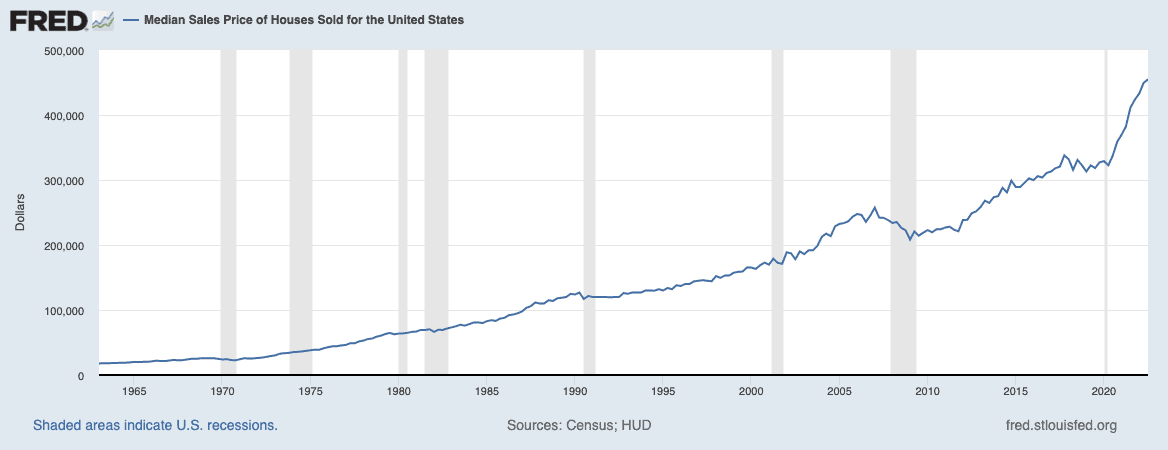2023 will be tougher for the housing market, but not the worst, according to the National Association of Realtors (NAR).
The Annual Real Estate Forecast Summit, organized by the NAR, delivered its verdict on 2023 late last year. The prognosis, put together by NAR Chief Economist Lawrence Yun, can be summarized as a slow year for home sellers. Although no immediate catastrophe is likely to hit the housing market, all the current trends point to a year of declining sales and slower home price growth in most areas.
Having said that, Yun identifies several emerging housing markets that will likely experience price increases in 2023, much like Austin and other cities did during the pandemic.
Home Sales Will Continue to Fall
The most significant prediction is that home sales will continue to drop in 2023. We’ve been on a downward trend through 2022, which will likely continue. Existing home sales dropped 16% during 2022 and is now at the lowest levels since 2014.
New housing starts are faring somewhat better, trending around its historical averages. The market for new housing starts survived its worst crisis in the aftermath of the 2008 financial crash, making a slow but steady recovery over the past decade.
The slowing down of this segment of the housing market next year is representative of the overall downward trend, but, as Yun points out, “new home sales are holding up better than existing home sales because new home sales really took a dive during the foreclosure crisis and never fully recovered from that, and hence they had a low base reference to compare.”
Home Price Growth Will Flatline or Decline
Home price growth is expected to flatline in 2023, ending the Covid price boom officially. The current prediction is an average increase of just 0.3% to an average home price of nearly $455,000. What that really means is that the housing market is still growing, just slowly.

According to the NAR, we’ve avoided a massive crash or anything close to a crisis. The job market has proven to remain strong, some markets have held their ground on price, and inflation has begun its descent. Yun points out that ‘‘today there are some layoffs in the mortgage industry and maybe the technology industry has stopped hiring people, but if you look at the net, there are still job creating conditions.’’
The other lifeline that’s prevented a crash is the mortgage market. It is safe to say that the tightening of borrowing rules after the subprime mortgage crisis of 2008 has made the housing market more resilient. “Subprime mortgages, those shady, risky, self-reporting mortgages, were widely prevalent during the last cycle. This time around, people have to meet the new regulations, so we don’t have those risky mortgages”, said Yun. The NAR also predicts that mortgage rates will fall below 6% sometime during Q3 2023 and remain there through the end of the year.
Finally, the supply-demand gap will not be bridged anytime soon. This means that buyer demand will continue to prop up the market for many months to come, which will keep home prices stable in most areas unless you are in California, which is predicted to experience a significant decline in home prices of 10-15%.
The Next Austin?
The NAR points towards the following metros as the housing market hotspots of 2023:
- Atlanta, Georgia
- Raleigh, North Carolina
- Dallas-Fort Worth, Texas
- Fayetteville-Springdale-Rogers, Arkansas-Missouri
- Greenville, South Carolina
- Charleston, South Carolina
- Huntsville, Alabama
- Jacksonville, Florida
- San Antonio, Texas
- Knoxville, Tennessee
The South will lead the way in 2023. According to Yun, “Southern states, generally speaking, meet the criteria of reasonable affordability, in-migration, and high-paying jobs being created.”
Real estate investors should take note of this trend if they want to capitalize on these market opportunities before they inevitably become oversaturated, as has been the case with Austin.
Find an Agent in Minutes
Match with an investor-friendly real estate agent who can help you find, analyze, and close your next deal.
- Streamline your search.
- Tap into a trusted network.
- Leverage market and strategy expertise.
Note By BiggerPockets: These are opinions written by the author and do not necessarily represent the opinions of BiggerPockets.
















